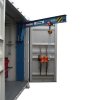- Joined
- Apr 18, 2014
- Messages
- 244
Hi!
I've been lurking on this forum for a several years and have made a few of my knives for myself. I built my own propane forge a few years ago which worked well but have since moved more towards stock removal because of the setup time of having to forge outside my shop. I would like to start doing more forging, but rarely have the time to lug my forge/anvil/paraphernalia outside. For those of you using propane forges inside your shops (as I've seen in multiple videos), how do you avoid burning/sooting the roof of your shop? Also, what do you do for ventilation? Box fans in windows? How about sparks/hot metal flying about during forging?
I'm about to expand my shop about 20' in length (fully enclosed, HVAC, slab floor), so I'm thinking about the option of forging indoors if I can do so safely.
Thanks,
Mike
I've been lurking on this forum for a several years and have made a few of my knives for myself. I built my own propane forge a few years ago which worked well but have since moved more towards stock removal because of the setup time of having to forge outside my shop. I would like to start doing more forging, but rarely have the time to lug my forge/anvil/paraphernalia outside. For those of you using propane forges inside your shops (as I've seen in multiple videos), how do you avoid burning/sooting the roof of your shop? Also, what do you do for ventilation? Box fans in windows? How about sparks/hot metal flying about during forging?
I'm about to expand my shop about 20' in length (fully enclosed, HVAC, slab floor), so I'm thinking about the option of forging indoors if I can do so safely.
Thanks,
Mike

